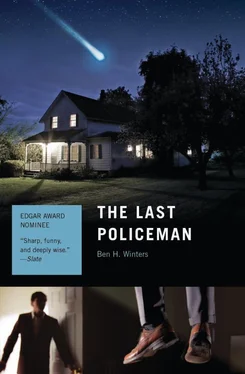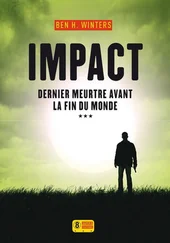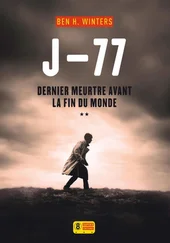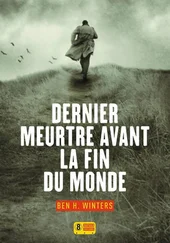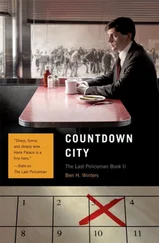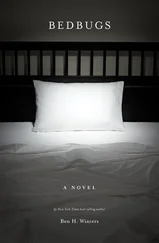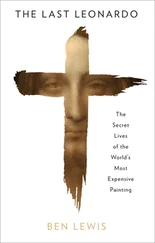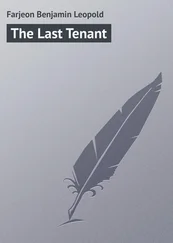Ben H. Winters
THE LAST POLICEMAN
To Andrew Winters,
of the Concord Winters
“Even for Voltaire, the supreme rationalist, a purely rational suicide was something prodigious and slightly grotesque, like a comet or a two-headed sheep.”
—A. Alvarez,
The Savage God: A Study of Suicide

“And there’s a slow,
slow train comin’,
up around the bend.”
—Bob Dylan, “Slow Train”

I’m staring at the insurance man and he’s staring at me, two cold gray eyes behind old-fashioned tortoiseshell frames, and I’m having this awful and inspiring feeling, like holy moly this is real, and I don’t know if I’m ready, I really don’t.
I narrow my eyes and I steady myself and I take him in again, shift on my haunches to get a closer look. The eyes and the glasses, the weak chin and the receding hairline, the thin black belt tied and tightened beneath the chin.
This is real. Is it? I don’t know.
I take a deep breath, demanding of myself that I focus, block out everything but the corpse, block out the grimy floors and the tinny rock-and-roll Muzak from the cheap speakers in the ceiling.
The smell is killing me, a pervasive and deeply unpleasant odor, like a horse barn that’s been splashed with French-fry grease. There are any number of jobs in this world still being efficiently and diligently accomplished, but the late-night cleaning of twenty-four-hour fast-food-restaurant bathrooms is not among them. Case in point: the insurance man had been slumped over in here, lodged between the toilet and the dull green wall of the stall, for several hours before Officer Michelson happened to come in, needing to use the john, and discovered him.
Michelson called it in as a 10-54S, of course, which is what it looks like. One thing I’ve learned in the last few months, one thing we’ve all learned, is that suicides-by-hanging rarely end up dangling from a light fixture or a roof beam, like in the movies. If they’re serious, and nowadays everybody is serious, would-be suicides fasten themselves to a doorknob, or to a coat hook, or, as the insurance man appears to have done, to a horizontal rail, like the grab bar in a handicapped stall. And then they just lean forward, let their weight do the work, tighten the knot, seal the airway.
I angle farther forward, readjust my crouch, trying to find a way to share space comfortably with the insurance man without falling or getting my fingerprints all over the scene. I’ve had nine of these in the three and a half months since I became a detective, and still I can’t get used to it, to what death by asphyxiation does to a person’s face: the eyes staring forward as if in horror, laced with thin red spiderwebs of blood; the tongue, rolled out and over to one side; the lips, inflated and purplish at the edges.
I close my eyes, rub them with my knuckles, and look again, try to get a sense of what the insurance man’s appearance had been in life. He wasn’t handsome, that you can see right away. The face is doughy and the proportions are all just a little off: chin too small, nose too big, the eyes almost beady behind the thick lenses.
What it looks like is that the insurance man killed himself with a long black belt. He fastened one end to the grab bar and worked the other end into the hangman’s knot that now digs brutally upward into his Adam’s apple.
“Hey, kid. Who’s your friend?”
“Peter Anthony Zell,” I answer quietly, looking up over my shoulder at Dotseth, who has opened the door of the stall and stands grinning down at me in a jaunty plaid scarf, clutching a steaming cup of McDonald’s coffee.
“Caucasian male. Thirty-eight years old. He worked in insurance.”
“And let me guess,” says Dotseth. “He was eaten by a shark. Oh, wait, no: suicide. Is it suicide?”
“It appears that way.”
“Shocked, I am! Shocked!” Denny Dotseth is an assistant attorney general, a warhorse with silver hair and a broad, cheerful face. “Oh, geez, I’m sorry, Hank. Did you want a cup of coffee?”
“No, thank you, sir.”
I give Dotseth a report on what I’ve learned from the black faux-leather wallet in the victim’s back pocket. Zell was employed at a company called Merrimack Life and Fire, with offices in the Water West Building, off Eagle Square. A little collection of movie stubs, all dating from the last three months, speaks to a taste for adolescent adventure: the Lord of the Rings revival; two installments of the sci-fi serial Distant Pale Glimmers; the DC-versus-Marvel thing at the IMAX in Hooksett. No trace of a family, no photographs in the wallet at all. Eighty-five dollars in fives and tens. And a driver’s license, with an address here in town: 14 Matthew Street Extension, South Concord.
“Oh, sure. I know that area. Some nice little town houses down that way. Rolly Lewis has a place over there.”
“And he got beat up.”
“Rolly?”
“The victim. Look.” I turn back to the insurance man’s distorted face and point to a cluster of yellowing bruises, high on the right cheek. “Someone banged him one, hard.”
“Oh, yeah. He sure did.”
Dotseth yawns and sips his coffee. New Hampshire statute has long required that someone from the office of the attorney general be called whenever a dead body is discovered, so that if a murder case is to be built, the prosecuting authority has a hand in from Go. In mid-January this requirement was overturned by the state legislature as being unduly onerous, given the present unusual circumstances—Dotseth and his colleagues hauling themselves all over the state just to stand around like crows at murder scenes that aren’t murder scenes at all. Now, it’s up to the discretion of the investigating officer whether to call an AAG to a 10-54S. I usually go ahead and call mine in.
“So what else is new, young man?” says Dotseth. “You still playing a little racquetball?”
“I don’t play racquetball, sir,” I say, half listening, eyes locked on the dead man.
“You don’t? Who am I thinking of?”
I’m tapping a finger on my chin. Zell was short, five foot six maybe; stubby, thick around the middle. Holy moly, I’m still thinking, because something is off about this body, this corpse, this particular presumptive suicide, and I’m trying to figure out what it is.
“No phone,” I murmur.
“What?”
“His wallet is here, and his keys, but there’s no cell phone.”
Dotseth shrugs. “Betcha he junked it. Beth just junked hers. Service is starting to get so dicey, she figured she might as well get rid of the darn thing now.”
I nod, murmur “sure, sure,” still staring at Zell.
“Also, no note.”
“What?”
“There’s no suicide note.”
“Oh, yeah?” he says, shrugs again. “Probably a friend will find it. Boss, maybe.” He smiles, drains the coffee. “They all leave notes, these folks. Although, you have to say, explanation not really necessary at this point, right?”
“Yes, sir,” I say, running a hand over my mustache. “Yes, indeed.”
Читать дальше
